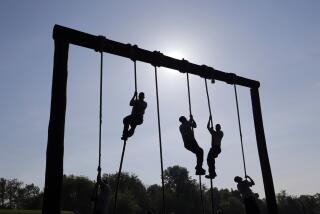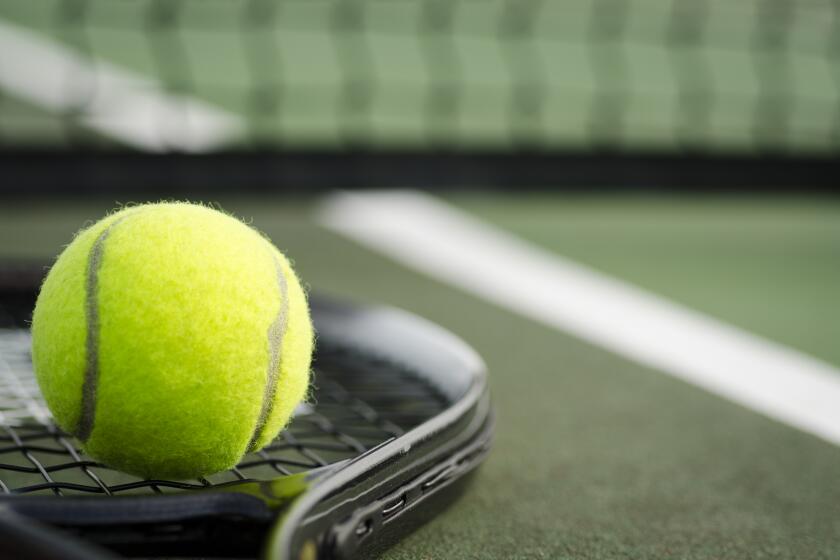ARMY vs. NAVY : This Football Rivalry Is Different, All Right, and That Is to Be Appreciated
- Share via
ANNAPOLIS, Md. — The first three things they teach plebes at the Naval Academy, according to Rear Adm. R.F. Marryott are, “Yes, Sir,” “No, Sir” and “Beat Army.”
“I remember the year,” said Marryott, the superintendent of the academy, recalling days when campus discipline was not his responsibility, “that we (Navy) rented a small airplane and rained Ping Pong balls with ‘Beat Army’ on them on the Army pre-game parade. Of course, I would not condone anything like that in my present capacity.
“Then there was the time all the Army seats in the stadium somehow got swabbed with limburger cheese. Very smelly day.”
No, Marryott certainly wouldn’t allow that now. Couldn’t possibly be that Navy had anything like that planned for Saturday. As for those three Army Cadets who appeared on national TV last week, dressed in terrorist-type stocking masks, holding a goat--purported to be Bill, the Navy mascot--as a hostage, Marryott enunciated the official Navy position. “I can’t believe they fell for the oldest trick in the book,” said the admiral. “The ol’ decoy goat.”
Navy Coach Elliot Uzelac, an assistant here 15 years ago, reported that, despite the approach of middle age, “My knee feels great and I’m ready to play.” Even grown men start getting foolish as the Army-Navy kickoff approaches.
“When I was here before, I was a wild young guy. They had to patrol me and control me. But I really loved the Army-Navy game,” said Uzelac. “I’ll never forget the year that everybody thought the President was coming because he’d come the year before. The (motorcade) drove around the stadium and slowed down but didn’t stop in front of the Navy side. Then, it stopped in front of the Army fans. They were going crazy. The door opened and out jumped the Navy goat.”
If Uzelac and Marryott seem carried away, almost to the point of childishness, it’s because they admit that they are. “Very few people who aren’t directly connected with this game understand its greatness,” said Uzelac, now back at Navy in his rookie year as coach after seven years as line coach at Michigan. “This is better by far than any rivalry in college football. It’s far more meaningful than, say, Michigan against Ohio State. Every time I say that to Bo (Schembechler) he gets madder and madder.
“I’ve seen coaches cry before this game,” said Uzelac, chuckling. “It was one reason why I wanted to come here and stay here, hopefully to coach in this game the rest of my career.”
Many scoff at the Army-Navy game in seasons like this when the respective records are 4-6 and 2-8, when there are no Blanchards and Davises, no Bellinos and Staubachs, no McCallums and Dawkins, anywhere in sight.
Far more, however, do not. The Army-Navy game is for people who think the rest of college football needs a good fumigation, but who still love a silly, hyperbolic rivalry between two schools whose kids go to lab first and practice afterward. If there’s time left.
College football is great in its place and a disgrace out of place. Army-Navy is virtually the only big-time showdown game where you always know that both programs could stand up to houndstooth scrutiny. That, perhaps, is why the Army-Navy game last season had the second-highest TV rating of any nationally broadcast college football game. It’s in the top five almost every year.
“People know that our athletes are students and officers first--not just future pro football players,” says Navy Athletic Director J.O. (Bo) Coppedge.
Before we get misty eyes, lets point out that this is hardly a vintage service academy year. Army, which might have been a potential bowl contender, was down to its sixth-string quarterback at one point and lost four games by a touchdown or less. The Cadets were fairly healthy for Navy, with senior Tory Crawford running the option once again. Navy was making the difficult transition to Uzelac’s wishbone offense with freshman Alton Grizzard holding the gear shift.
“The question is probably, ‘Why did Navy take so long to get to the wishbone,’ ” said Marryott. “We’re never going to recruit the prime-cut quarterback headed to the NFL. We’ll grow the occasional Napoleon McCallum who develops while he’s here. We always pride ourselves on emphasizing the ‘whole man,’ so why haven’t we used an option offense that emphasizes the whole team and doesn’t require these great individual skill players?
“Army and Air Force proved it was the successful way to go. We’re last.”
With the wishbone, you don’t need a great throwing quarterback or fleet, gifted receivers. And, since option quarterbacks have no NFL future, you can recruit that position at a higher level. Also, the wishbone can make do with smaller guards and less quality linemen, in general. “You don’t have to block two defenders because you’re optioning off them,” says Uzelac. “Obviously that reduces your problems a bit at a school like Navy that is never going to get the huge linemen.”
On Saturday in Veterans Stadium in Philadelphia, two rather small and not terribly good college football teams challenged each other. A great many of us who manage never to watch Miami or Oklahoma surprised ourselves and found the time to tune in.
More to Read
Go beyond the scoreboard
Get the latest on L.A.'s teams in the daily Sports Report newsletter.
You may occasionally receive promotional content from the Los Angeles Times.










